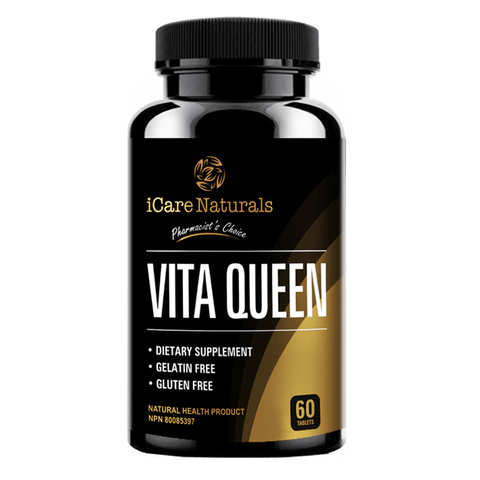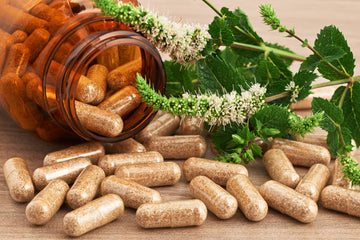Allergy is a response of our immune system – and while there could be a lot of triggering agents – like dust, food, and dander – these allergies can be easily treated with environmental changes or medicines. Seasonal allergies can be quite disruptive – with symptoms such as sneezing, itchy eyes, runny noses, and a mild cough causing discomfort for many of us. Luckily, there’s growing evidence that suggests that dietary choices and a combination of supplements can offer relief from these symptoms.
A common strategy to decrease allergy symptoms is to take antihistamines – but they may have side effects such as drowsiness, fatigue, headaches, nausea, rashes, or insomnia. Dietary supplements, on the other hand, have fewer side effects.
We’ve compiled a list for you to help you combat seasonal allergies – so consider incorporating these 10 essential nutrients and supplements in your diet when confronted with sneezing or a sore throat.

Magnesium
A vital mineral, magnesium is known to help open up your airways – potentially offering relief from allergy symptoms. It is recommended that you consume around 200 mg of a magnesium supplement for added relaxation and relief from your symptoms. As an alternative, you may consider enjoying a soothing bath with Epsom salts or milk of magnesia.
Vitamin C
We all know that Vitamin C is commonly associated with fighting off colds, but did you also know that it can provide relief for symptoms of seasonal allergies? When allergies strike, histamine levels in the body rise. Vitamin C can help lower the release of histamine and speed up its breakdown. Incorporating Vitamin C supplements into your diet can help ease that sniffly or runny nose associated with seasonal allergies. Alternatively, Vitamin C is abundant in foods such as oranges, peppers, and tomatoes.
Bioflavonoids
Bioflavonoid supplements are available in the form of capsules, tablets, and powders. These supplements contain concentrated amounts of the substance – which is extracted from various plant sources such as citrus fruits, berries, and green tea. They are known for their antioxidant properties and help support cardiovascular health – reducing inflammation and improving immune function. Don’t forget to add Brussels sprouts, mangoes, and garlic to your shopping list as well – they’re all full of bioflavonoids.
Quercetin
A natural plant pigment and antioxidant, Quercetin is beneficial for alleviating symptoms of seasonal allergies. This nutrient works by suppressing the part of the immune system responsible for triggering allergic reactions – and also helps to reduce histamine levels in the body. Incorporating Quercetin into your diet may help provide relief from sneezing, itching, and other discomforts associated with your seasonal allergies. This herb is found naturally in foods like green apples, onions, parsley, and sage.
Vitamin D
While Vitamin D is well-known for its role in bone health, new research suggests that Vitamin D may also play a vital role in modulating allergic responses and reducing the risk of allergies, including seasonal allergies. Adequate levels of Vitamin D have been associated with a lower incidence of allergic rhinitis and other allergic conditions. While adequate sunlight exposure is enough Vitamin D for most people – supplementation may be necessary if you live in regions with longer winters or have limited sun exposure.
Zinc
A natural mineral found in many foods, Zinc helps your body grow and develop – and also plays a role in allergic responses. Zinc is best known for its role in strengthening your immune system, and helps reduce inflammation caused by allergies. People with a zinc deficiency are up to five times more likely to have alleriges than people without a deficiency – so load up on that Zinc!
Bromelain
Bromelain is a proteolytic enzyme found in fruits such as pineapples – known for its antiasthmatic, anti-inflammatory, and immunomodulatory properties. It has been shown to reduce nasal mucus production, decrease nasal swelling, and improve nasal draining – and for this reason it has proved to be beneficial for alleviating symptoms of seasonal allergies. When used alongside allergy medication, bromelain supplements may enhance the effectiveness of your seasonal allergy treatment.
Butterbur
Butterbur is commonly known for its use in addressing migraine, but it has recently gained attention for its potential benefits in relieving allergy symptoms as well – such as hay fever and seasonal allergies. Research further indicates that butterbur may have the ability to decrease histamine levels, so incorporating butterbur supplements will offer you plenty of relief from symptoms such as sneezing, itching, and nasal congestion associated with hay fever.
Omega-3s
Omega-3 fatty acids have been linked to a reduced risk of allergies – including allergic rhinitis. Incorporating this supplement into your diet may help decrease the severity of allergy symptoms such as sneezing, itching and nasal congestion during the allergy season. These supplements are readily available for those who may not consume enough fish, nuts and seeds too – offering an alternative way to reap the potential benefits of these powerful foods.
Probiotics
There’s a strong link between your gut and immune system, which means that foods that are benficial for your stomach can also help maintain your sinuses. Consider incorporating probiotic supplements into your routine – as they contain live beneficial bacteria that help restore or maintain a healthy balance of gut microbiota. These supplements come in the form of capsules, tablets, powders and even liquids – so choose a probiotic supplement with strains that are beneficial for you. Alternatively, increasing your intake of fermented foods like miso, tempeh, greek yogurt and kefir can also help maintain your gut bacteria. Follow the recommended dosage instructions provided by the manufacturer or a healthcare professional.

The Bottom Line
Managing seasonal allergies can be challenging – but incorporating certain natural supplements into your diet can offer you relief from seasonal allergy symptoms. From magnesium and probiotics to Vitamin C, these nutrients can help reduce your inflammation, stabilize your immune responses, and even alleviate allergic reactions. Supplements like Butterbur and Omega-3 fatty acids show promise in relieving hay fever symptoms and decrease the severity of your allergic reactions.
Whether you incorporate supplements through dietary sources or opt for OTC supplements, incorporating these natural remedies into your routine will provide you with a holistic approach to managing your seasonal allergies – improving your overall well-being.






